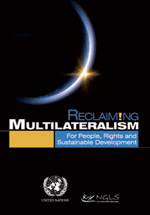Published on Thu, 2012-07-05 12:06
The Afghanistan Young Leaders Initiative, a non-partisan and non-political group of young people who share common values and beliefs to address the social, economic and political problems in the country, asked the Tokyo Conference on Afghanistan that will be held on Sunday 8 “a proper follow-up mechanism […] to ensure the promises delivered upon from both the […] government and its international development partners”. |
Published on Thu, 2012-07-05 09:13
South Korea postponed last week at the last minute the signing of a major military agreement with Japan. Watchdog group Citizens’ Coalition for Economic Justice, focal point of Social Watch in the Republic of Korea, said it would help Japan's rearmament and pave the way for its troops to set foot on the peninsula, reported AFP news agency and several media. |
Published on Thu, 2012-07-05 09:11
Seventeen human rights non governmental organizations launched on Wednesday officially launched their “Human Rights in 100 Days” campaign to pressure new Egyptian President Mohamed Morsi to follow through on rights of Egyptian citizens. |
Published on Thu, 2012-07-05 09:00
“Reclaiming Multilateralism: For People, Rights and Sustainable Development,” the latest United Nations Non-Governmental Liaison Service (UN-NGLS) publication, is an analytical think piece that looks at the evolution of the multilateral system in the context of the various challenges posed by the global economic and environmental crises. The publication, authored by Barbara Adams and Gretchen Luchsinger, seeks to engage all stakeholders – whether government, multilateral, regional, and sub-national institutions, civil society and social movements – in an open debate on a “new multilateralism” or rather what kinds of development and governance models the multilateral system should be endorsing that would balance and regulate the political, economic and social shifts brought by globalization and bring the promises of justice, equity and sustainable development to fruition. |
Published on Tue, 2012-07-03 08:37
Canada is not immune to the banking problems we see abroad, cautions “No More Swimming Naked”, a report released by the Canadian Centre for Policy Alternatives (CCPA) written by Ellen Russell, that examines how banks work, why they are inherently prone to instability, and how banking crises spread—even to banks and banking systems that appear to be stable. Russell warns that current regulations did not eliminate problems with risk-taking and overconfident behavior among banks. |
SUSCRIBE TO OUR NEWSLETTER







